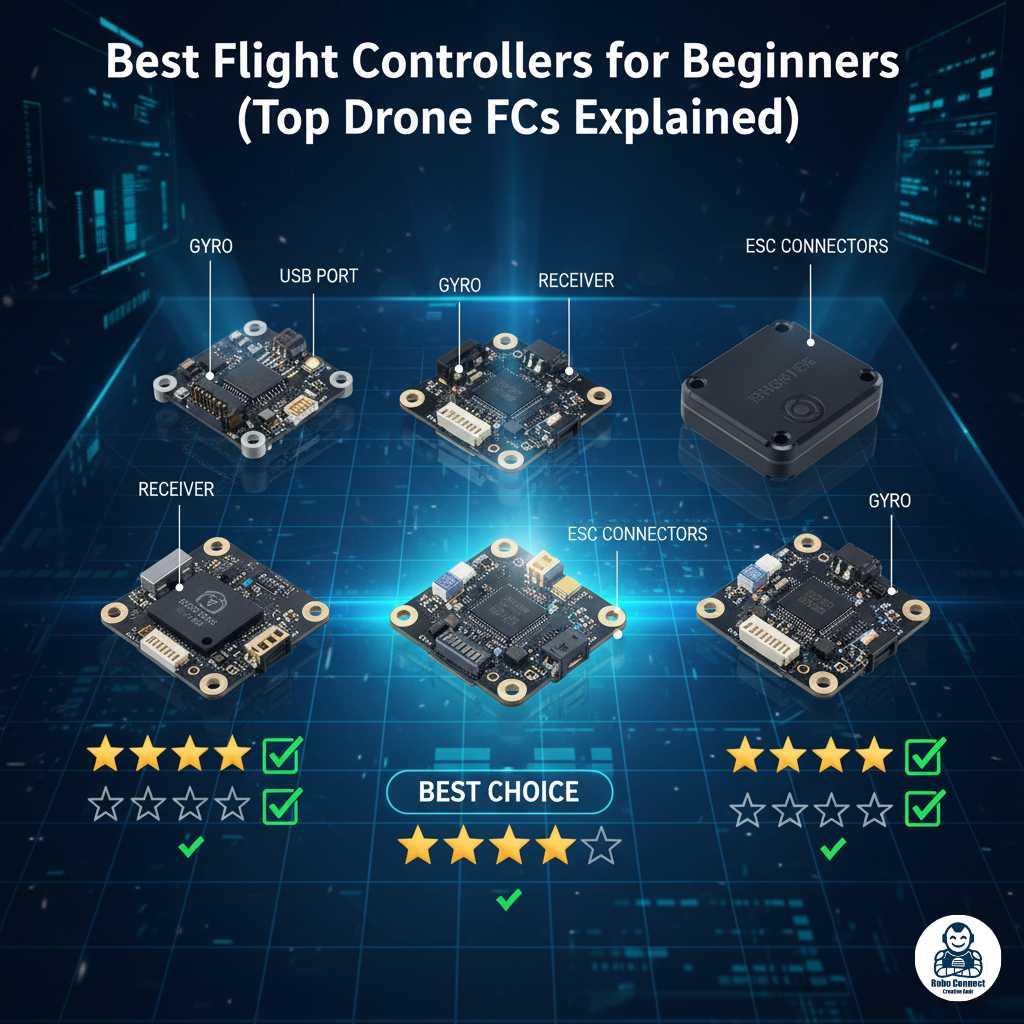Introduction
The Flight Controller (FC) is the “brain” of a drone. It takes your commands from the transmitter, interprets sensor data, and adjusts motor speeds to keep your drone stable in the air.
If motors are the “muscles” and propellers are the “wings,” then the flight controller is the nervous system.
But with dozens of options — KK2, Betaflight boards, Pixhawk, DJI Naza — which flight controller is best for beginners?
This guide explains:
- What a flight controller does.
- Features to look for as a beginner.
- Popular FC options compared (pros & cons).
- Recommendations for hobbyists, DIYers, and first‑time builders.
What Does a Flight Controller Do?
- Stabilization: Uses gyroscope + accelerometer to prevent wobble.
- Mixing signals: Converts pilot commands (yaw, pitch, roll, throttle) → ESC motor signals.
- Flight modes: Enables “Angle Mode,” “Acro Mode,” GPS Hold, Return‑to‑Home, etc.
- Integration: Can connect to FPV cameras, GPS modules, OSD (On Screen Display).
- Safety features: Low‑battery warning, failsafe auto‑land.
Key Features Beginners Should Look For
- Easy Setup → Plug‑and‑play, beginner‑friendly calibration.
- Firmware Support → Active community (Betaflight, Ardupilot, iNav).
- Sensor Quality → Stable IMU with gyro/accelerometer.
- Expandability → Ports for GPS, FPV cameras, telemetry.
- Price → Affordable enough to experiment with.
Top Flight Controllers for Beginners
- KK2.1.5 Flight Controller (Budget Pick)
- Pros:
- Cheap & simple.
- Built‑in LCD screen → configure without PC.
- Great for first DIY drone builds.
- Cons:
- Limited advanced features.
- No GPS/autonomous flight.
- Best For: Beginners learning basic quadcopter flight.
- Betaflight F4/F7 Boards (Freestyle/Racing Pick)
- Pros:
- Runs Betaflight firmware (huge community).
- Tons of flight modes + aggressive tuning for racing.
- USB setup with Betaflight Configurator software.
- Cons:
- Steeper learning curve than KK boards.
- Best For: FPV freestyle drones, intermediate beginners upgrading.
- Pixhawk 4 / Pixhawk Mini (GPS & Autonomous Pick)
- Pros:
- Supports Ardupilot and PX4 firmware (professional‑grade).
- Full autonomous missions, waypoint navigation, surveys.
- Expandable: GPS, telemetry, cameras, sensors.
- Cons:
- More expensive.
- Setup is detailed & technical.
- Best For: Builders interested in aerial mapping, delivery bots, research drones.
- DJI Naza‑M Lite / F3 (Plug‑and‑Play Pick)
- Pros:
- Very stable GPS hold & Return‑to‑Home.
- Beginner friendly → less tuning.
- Trusted DJI ecosystem.
- Cons:
- Limited customizability.
- Higher cost than open‑source options.
- Best For: Beginners who want safety + ease of use over tinkering.
Comparison Table
| Flight Controller | Price | Firmware | Beginner Ease ⭐ | Features | Best For |
| KK2.1.5 | Cheap | Stock | ⭐⭐⭐⭐ | Basic only | First drones |
| Betaflight F4/F7 | Mid‑range | Betaflight | ⭐⭐⭐ | FPV modes, OSD | Racing/Freestyle |
| Pixhawk | Higher | Ardupilot, PX4 | ⭐⭐ | GPS, autonomy | Pro DIY drones |
| DJI Naza | Higher | Proprietary | ⭐⭐⭐⭐ | GPS, RTH, safe flying | Hobby photographers |
Which Flight Controller Should You Pick?
- Absolute beginner, cheap build: KK2.1.5 controller.
- Want to get into FPV racing/freestyle: Betaflight boards (F4/F7).
- Want to try autonomous missions with GPS: Pixhawk.
- Don’t want hassle, just want stability: DJI Naza Lite.
Start simple → upgrade as your flying + building skills improve.
FAQs
Q1: Do I need a flight controller if I just want simple RC drone?
Yes — the FC is mandatory. Without it, you’d need to manually control each motor (impossible).
Q2: Can I use Arduino as a flight controller?
Technically yes (with custom firmware), but it’s very limited. Dedicated FC boards like KK2 or Pixhawk are far better.
Q3: What’s the easiest FC for first drone?
KK2.1.5 → cheap, LCD screen, minimal setup → good first step.
Conclusion
The flight controller is the essential brain of your drone. For beginners:
- KK2 → simplest way to learn.
- Betaflight → best if you dream of FPV racing.
- Pixhawk → for DIY survey/mapping drones.
- DJI Naza → when you want easy, safe flying.
Start with what matches your project goals → then experiment as you grow.

